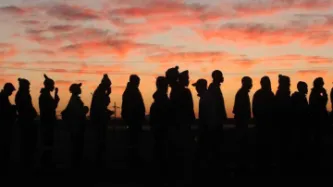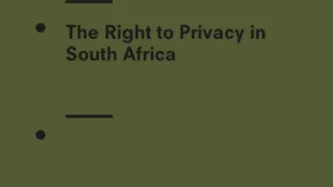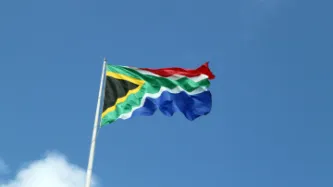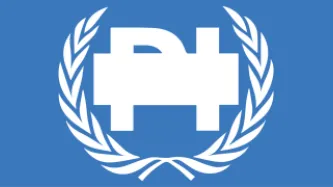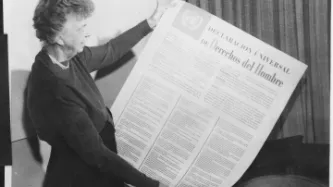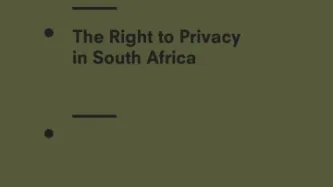Search
Content type: Examples
The Israeli digital ID card creator Pangea EVP has developed an immunity passport intended to give individuals access to public spaces, including airports. The passport will include a photo of the holder, a digital signature, a hologram, and a chip. When they want to fly, holders will insert flight and medical details into a web portal; the system will then advise the health protocol they need to follow. If they test negative for COVID-19, the laboratory will issue a smart card that…
Content type: Examples
Our partners from Right to Know campaign in South Africa produced this infosheet to simplify what the South African government has committed to doing in ensuring that the use of surveillance does not impact negatively on people’s rights to privacy and that necessary data protections are taken into cognizance, whilst the necessary safeguards are put in place to protect citizens during this period of COVID 19.
Link: https://www.r2k.org.za/2020/04/14/covid-19-surveillance-infosheet/
Content type: Examples
Researchers at the University of Cape Town are developing the smartphone app COVI-ID to help the South African government track people who may not know they have contracted COVID-19, as well as people who have come into contact with those who have tested positive. The app will use Bluetooth and geolocation (via GPS, cellphone tower signals, and wifi) to collect the personal locations of users along with their infection status and store the information on the device using self-sovereign identity…
Content type: Examples
The regulations brought in to curb the spread of COVID-19 in South Africa included directions published by the minister of communications and digital technologies that critics claimed violated the country's constitution. On the plus side, the regulations ordered service providers to ensure continued provision of internet and telecommunications services, and enabled temporary licensing of spectrum bands, which could increase internet capacity. However, the regulations also make publishing a…
Content type: Examples
The government has issued a substantial rewrite of a controversial proposal to track people using their phones and other devices in the bid to contain Covid-19. AmaBhungane, an investigative journalism newsroom, said the first “directions” – issued last week by the minister of communications – raised "serious concerns for their vagueness and lack of privacy protections”. The new regulations provide more judicial oversight, restrict the purpose to contact tracing, and aim to ensure that…
Content type: Examples
The South African National Institute for Communicable Diseases and the Council for Scientific and Industrial Research will partner with Telkom and Samsung to create a track and trace system specifically for the South African context, which includes high levels of economic inequality, poverty, and overcrowding. The system will collate data sources such as GIS in order to track those who may be infected and those whom they may expose to the virus. In some communities, the Department of Health…
Content type: Examples
South Africa's Communications Minister, Stella Ndabeni-Abrahams, has stated that telecommunications operators in the country have agreed to provide location data to identify how many people have been infected in a particular area. The Government has broad powers under a national state of disaster.
Writer: Philip de Wet
Publication: Business Insider
Content type: Long Read
In July 2015, representatives of a private company met in a parking lot in Pretoria, South Africa to sell phone tapping technology to an interested private buyer. What they did not know was that this buyer was a police officer. The police had been tipped off that the company was looking to offload the surveillance technology, an IMSI catcher, to anyone who would buy it. It is illegal to operate such surveillance technology as a private citizen in South Africa, and illegal to buy…
Content type: Advocacy
This stakeholder report is a submission by Privacy International (PI) and the Right2Know Campaign (R2K). This report has been prepared with the assistance and research done by the Media Policy and Democracy Project. PI is a human rights organisation that works to advance and promote the right to privacy and fight surveillance around the world. R2K is a broad- based, grassroots campaign formed to champion and defend information rights and promote the free flow of information in South Africa…
Content type: News & Analysis
This guest piece was written by Jane Duncan of the Right2Know Campaign. It does not necessarily reflect the views or position of Privacy International.
On 23rd March the United Nations Human Rights Committee released its assessment on South Africa’s compliance with the International Covenant on Civil and Political Rights (ICCPR). The report includes a blistering attack on the Government for failing to respect the privacy of the communications of users and makes…
Content type: News & Analysis
This week the UN Human Rights Committee has issued recommendations to the Governments of Namibia, New Zealand, Rwanda, South Africa, and Sweden to reform and strengthen surveillance and privacy protections.
The Committee recommendations touch upon some of the fundamental issues of surveillance powers and the right to privacy, including mass surveillance, retention of communication data, judicial authorisation, transparency, oversight, and regulating intelligence sharing.
These recommendations…
Content type: News & Analysis
This week will see the right to privacy take center stage at the UN in Geneva.
The UN Special rapporteur on the right to privacy will present his first report to the UN Human Rights Council on Wednesday 9 March. Meanwhile the Human Rights Committee will review the records of surveillance and the right to privacy of South Africa and Sweden among others.
The new Special Rapporteur on the right to privacy
A year ago the Human Rights Council established the mandate of the Special…
Content type: Advocacy
Privacy International, Right2Know, and the Association for Progressive Communications (hereinafter “the organisations”) note the written replies by the government of South Africa to the list of issues on South Africa’s laws, policies and practices related to interception of personal communications and protection of personal data.
The organisations have on-going concerns on the practices of surveillance by South African intelligence and law enforcement agencies. In this submission, the…
